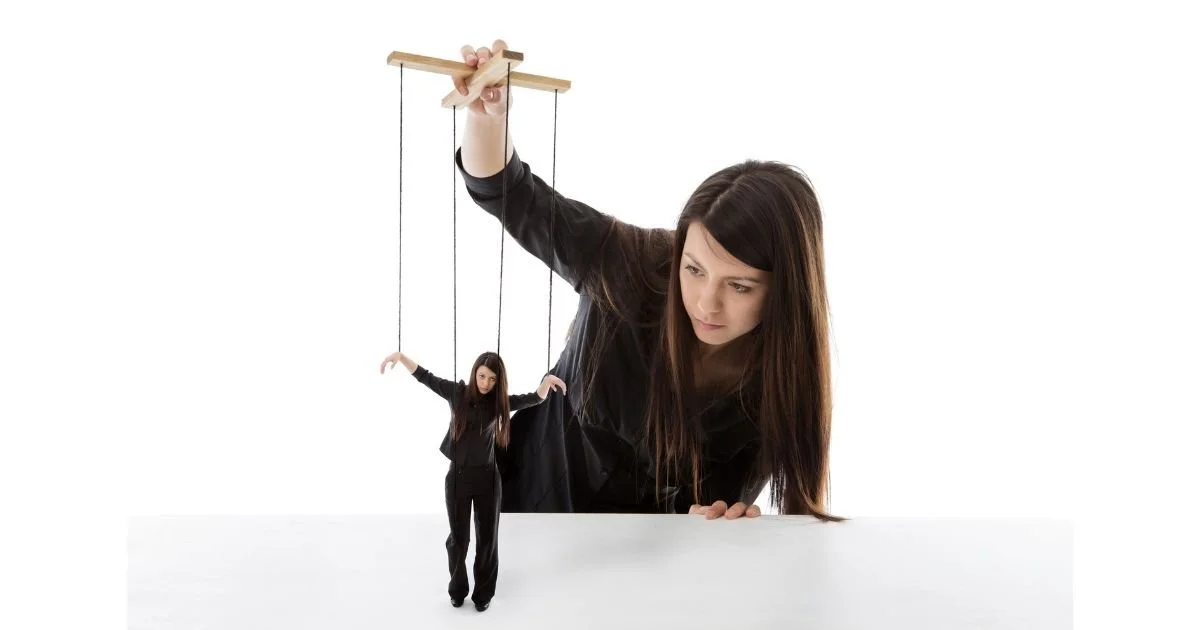Are You Gaslighting Yourself?
Woman controlling a puppet version of herself, symbolizing self-gaslighting.
We hear a lot about gaslighting others —
How someone can manipulate your reality until you don’t know what’s true anymore.
But what about when we do it to ourselves?
Self-gaslighting is subtle. It seeps in through hesitation, doubt, and the desire to avoid pain. It’s the story we whisper inside our heads to keep things from falling apart.
And most of the time, we don’t even realize we’re doing it.
What Is Gaslighting, Anyway?
You’ve probably heard the term used when talking about toxic relationships — someone twisting the truth so you end up questioning your own perception.
They might say things like:
“That never happened.”
“You’re too sensitive.”
“You’re imagining things.”
And over time, you start thinking:
Maybe I am the problem.
Maybe I misunderstood.
Maybe I’m making it worse than it is.
That’s gaslighting — and it works by slowly eroding your trust in yourself.
The term actually comes from a 1944 film called Gaslight, where a husband keeps dimming the gas lights in their home and then tells his wife she’s imagining it. The more she pushes back, the more he denies. Eventually, she begins to believe she’s losing her mind.
That’s the dangerous thing — it doesn’t have to be loud or aggressive. It just has to be repeated enough to make you start second-guessing what you feel and what you know.
Why We Gaslight Ourselves
Self-gaslighting is a form of protection.
Your unconscious mind isn’t obsessed with truth — it’s obsessed with safety. And if pretending everything’s fine helps you avoid conflict, rejection, failure, or abandonment? That’s what it will default to.
So we say things like:
“It’s not that bad.”
“Maybe I’m just being too sensitive.”
“This is what I signed up for, right?”
“They’re doing their best.”
We override our gut instincts and emotional discomfort not because we’re weak, but because — at some point — trusting those instincts got us in trouble.
Maybe speaking up led to being ignored. Maybe expressing pain got you called dramatic. Maybe you learned early on that keeping the peace was safer than being honest.
So self-gaslighting becomes a built-in reflex:
If I don’t feel this, I don’t have to deal with it.
The Hidden Cost of Self-Protection
But here’s the kicker: What protects us in the short term often hurts us in the long run.
You can only suppress the truth for so long before it starts showing up in your body and your life. The red flags you ignore? They eventually turn into symptoms — exhaustion, irritability, anxiety, chronic overthinking, apathy, or burnout.
You start forgetting what you like. You second-guess your every move. You feel like you’re living in a fog no planner or productivity hack can clear.
Because your brain isn’t just tired. It’s at war with itself.
One part of you knows something’s not right. The other part is working overtime to convince you it’s fine.
And that quiet tug-of-war? It drains your clarity, your confidence, and your connection to yourself.
What Self-Gaslighting Looks Like in Real Life
It rarely screams. It whispers. And it hides in places you think you’ve got under control.
👉 Like the woman who kept trying to fix her marriage, even though she hadn’t felt emotionally safe in years.
She told herself she was being too sensitive. That all marriages go through hard times. That maybe she was the problem.
When she finally admitted she wasn’t happy — and hadn’t been for a long time — she cried for hours. Not out of grief… but relief.
She said, “I feel like I’ve been lying to myself for a decade.”
👉 Or the man who stayed in a job where he was slowly disappearing.
He convinced himself he was lucky to have it. That his boss wasn’t that demeaning. That if he just kept proving his worth, things would get better.
But his spark was gone. His creativity dried up.
And every Sunday night, he felt that dread in his chest — the kind he thought was normal…
until he remembered it didn’t have to be.
👉 Then there was the woman who said yes to everything.
She showed up with a smile, did everything for everyone else — and quietly resented how no one checked in on her.
She told herself it was noble to be the strong one. That needing help was weakness. But underneath it all, something was screaming:
“Why can’t I matter too?”
Different stories. Same pattern.
Each of them had been taught — by life, family, fear — that honoring themselves would cost them love, connection, or approval.
So they made themselves smaller. Kinder. Quieter. More “reasonable.”
Until they couldn’t anymore.
It Doesn’t Always Look Like Drama
Sometimes it’s as quiet as:
Nodding in a meeting while your stomach churns
Laughing off a comment that actually hurt
Staying in a job or relationship that slowly erodes your confidence
Justifying someone else’s behavior because the grief of letting go feels too heavy
Telling yourself you’re “too emotional” when your body is simply being honest
Sometimes it sounds responsible. Sometimes it looks like patience. Sometimes it even gets you praise — because people love it when you don’t rock the boat.
But underneath?
You feel yourself disappearing.
What Happens When You Finally Stop
That first moment you stop gaslighting yourself?
It might not be some big, dramatic exit. It might just be a pause. A breath. A whisper of truth:
“This isn’t working.”
“I don’t feel safe here.”
“I’m allowed to want more.”
And when that happens — when you listen, even if you’re scared — your nervous system starts to settle. The fog lifts a little. You realize you’re not bracing for impact 24/7 anymore.
You might not know exactly where you’re going next… but the weight of pretending is gone.
And with it, something returns: Your energy. Your clarity. Your voice.
It’s not about making everything perfect. It’s about no longer forcing yourself to tolerate what’s not aligned.
Because safety doesn’t come from shrinking.
It comes from living in truth.
🌀 A Final Thought
Self-gaslighting is a survival strategy that worked — until it didn’t.
To those gaslighting themselves, it’s costing you more than it’s saving you.
It’s not selfish to trust yourself. It’s not dramatic to honor what your body is trying to tell you.
It’s not weak to say “This is not okay.”
The people-pleasing, the downplaying, the “I’m fine” mask — those were never your truth.
They were protection.
But you’re not just here to survive anymore.
You’re here to live.
And that begins when you stop editing your truth to make it easier for others to swallow.
If this hit home, you’re not alone — and you don’t have to untangle it all by yourself.
This is the work I do every day: helping people recognize the patterns that are running the show, gently question the stories that no longer serve them, and reconnect with the version of themselves that knows what’s true.





